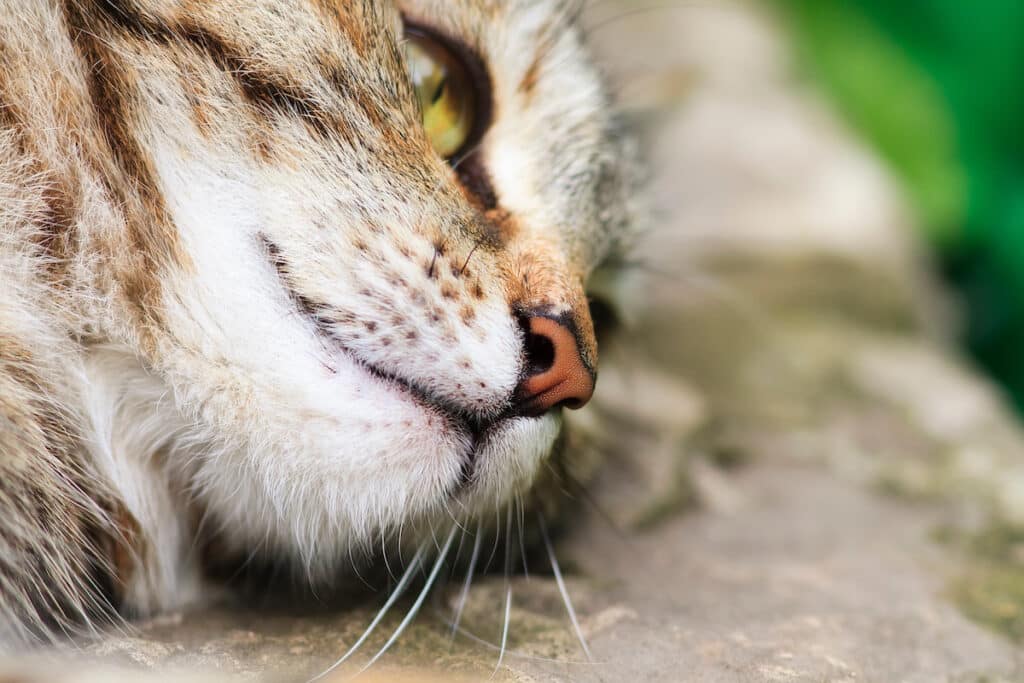Generally speaking, a runny nose is caused by a cold, allergies or chronic rhinitis. It may also be caused by a nasal polyp.
Chronic rhinitis
Among the upper respiratory tract diseases in cats, chronic rhinitis is the most common and it is associated with nasal inflammation. Although it can be a chronic problem, it can be successfully managed. There are several treatments that may be used to treat chronic rhinitis in cats.
Chronic rhinitis in cats is caused by a variety of viral and bacterial infections. The viral infection causes inflammation and damages the mucous membranes in the nose. This leads to a secondary bacterial infection that can lead to nasal discharge and bone infection.
The most common cause of chronic rhinitis in cats is feline herpesvirus type 1. The virus can lead to turbinate destruction and mucosal epithelium destruction. The immune system in cats is suppressed by the virus, allowing bacteria to infect and invade the nasal cavity.
The nasal discharge of a cat with chronic rhinitis is mucoid, purulent, and bilateral. Often, the nasal discharge is associated with sneezing. Surgical removal of the turbinate tissue may help increase airflow through the nasal cavities. However, some nasal discharge may persist after this procedure.
Allergies
Symptoms of a runny nose in a cat may be a sign of an upper respiratory infection or a bacterial infection. If your cat has a runny nose, make an appointment with a veterinarian.
If your cat is inhaling pollen or dust, he is likely to be allergic to the particles. You may want to clean your house regularly and vacuum the area.
Cats can also be allergic to certain foods, medicines, or fragrances. If you suspect that your cat is allergic to something, you may want to try an immunotherapy treatment. The problem is that not all cats are suited for immunotherapy.
Other common causes of a runny nose in kitty include allergies to dust and fleas. Vaccinations can help control these infections. You should also keep an eye out for a nasal discharge that has blood or pus.
Allergies to cats can be difficult to diagnose. Your vet can rule out underlying health issues such as allergies and infection. Some cats are also allergic to perfumes or cigarette smoke.
Cold
Keeping your cat healthy is always important, but if he or she develops a cold, you may want to seek veterinary attention. Colds are common in cats and there are several treatments available.
A common symptom of a cold in a cat is a runny nose. This may be caused by a bacterial infection, or it may be due to an inflammatory disorder. A bacterial infection may be more serious, and will require antibiotics.
Another symptom is sneezing. Cats have the same respiratory system as humans, but they metabolize medications differently. Medications such as aspirin and acetaminophen are safe for humans, but can be toxic to cats.
A green or yellow nasal discharge is another symptom of a cold in a kitty. This discharge is usually a symptom of a bacterial infection, and can be wiped out by wiping with a clean, damp cloth.
A cat that has a runny nose may not be interested in food, or may have trouble smelling it. In this case, you may want to give it a warm, moist bowl of cat food to stimulate his appetite.
Non-cancerous nasal polyps
Usually, nasal polyps in cats are not caused by any specific disease, but can be a sign of chronic inflammation of the upper respiratory tract. Nasal polyps are formed when the nasal passages become irritated by toxins and allergens. They may occur in groups or one at a time, but are generally soft and pearl-colored.
Nasal polyps can cause a runny nose in cats and partial obstruction of the nasal passages. They may also cause chronic nasal infections. Surgical removal is the recommended treatment for nasal polyps. However, surgery can be risky and may cause side effects.
If nasal polyps are diagnosed in your cat, your veterinarian may perform diagnostic imaging tests such as CT scans or MRIs to examine the extent of the growth. In some cases, a biopsy is required to determine whether the growth is malignant or benign.
In some cases, anti-inflammatory drugs may be used instead of surgery. These drugs can reduce inflammation at the surgery site and decrease the size of the polyp.














